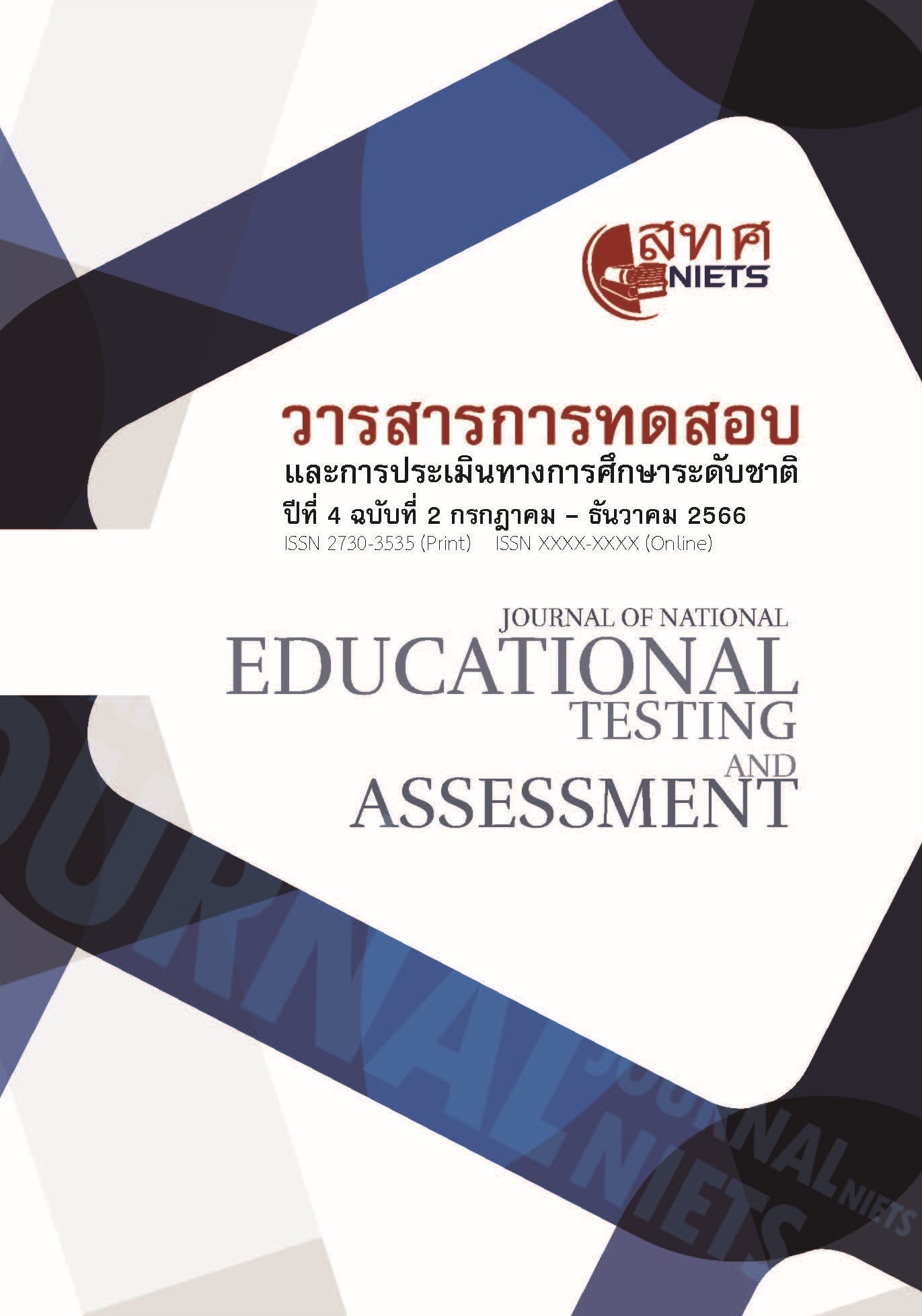การพัฒนาแพลตฟอร์มการจัดการเรียนรู้โดยใช้ความท้าทายเป็นฐานรายวิชาการวิเคราะห์นโยบายและ กลยุทธ์การศึกษายุคดิจิทัลสำหรับผู้เรียนระดับบัณฑิตศึกษา : การประเมินนวัตกรรมทางการศึกษา
Main Article Content
บทคัดย่อ
วัตถุประสงค์ของการวิจัยครั้งนี้ 1) เพื่อออกแบบและสร้างต้นแบบแพลตฟอร์มการจัดการเรียนรู้โดยใช้ความท้าทายเป็นฐานรายวิชาการวิเคราะห์นโยบายและกลยุทธ์การศึกษายุคดิจิทัลสำหรับผู้เรียนระดับบัณฑิตศึกษา 2) เพื่อทดสอบหาประสิทธิภาพตามเกณฑ์ 80/80 ค่าดัชนีประสิทธิผล และผลสัมฤทธิ์ทางการเรียนของการใช้แพลตฟอร์มที่พัฒนาขึ้น และ 3) เพื่อศึกษาความคิดเห็นของผู้เชี่ยวชาญและความพึงพอใจของผู้เรียนที่มีต่อแพลตฟอร์มที่พัฒนาขึ้น กลุ่มเป้าหมาย ได้แก่ นักศึกษาหลักสูตรศึกษาศาสตรมหาบัณฑิต สาขาวิชาบริหารการศึกษาและกลยุทธ์ มหาวิทยาลัยเทคโนโลยีราชมงคลรัตนโกสินทร์ ปีการศึกษา 2566 จำนวน 14 คน เครื่องมือที่ใช้ในการวิจัย ได้แก่ แบบสอบถาม แบบสัมภาษณ์ และแบบสนทนากลุ่ม สถิติที่ใช้ในการวิเคราะห์ข้อมูล ได้แก่ ร้อยละ ค่าเฉลี่ย ส่วนเบี่ยงเบนมาตรฐาน และค่าสถิติทดสอบที ผลการวิจัยพบว่า 1) แพลตฟอร์มที่พัฒนาขึ้นมีโครงสร้างที่ประกอบด้วยเว็บไซต์ ฐานข้อมูลอาจารย์และนักศึกษา บันทึกความรู้ แบบประเมินความรู้ กระดานสนทนาแบบท้าทาย คลังความรู้ ดาวน์โหลดเอกสาร และภาพกิจกรรมต่าง ๆ 2) แพลตฟอร์มการจัดการเรียนรู้ที่พัฒนาขึ้นมีประสิทธิภาพ 81.88/82.94 ซึ่งสอดคล้องกับเกณฑ์ 80/80 และมีค่าดัชนีประสิทธิผลเท่ากับ .8146 ผู้เรียนที่เรียนด้วยแพลตฟอร์มดังกล่าวมีผลสัมฤทธิ์ทางการเรียนหลังเรียนสูงกว่าก่อนเรียนอย่างมีนัยสำคัญทางสถิติที่ระดับ .05 และ 3) จากการทดลองใช้แพลตฟอร์มปรากฏผล การประเมินคุณภาพโดยผู้เชี่ยวชาญอยู่ในระดับมาก ผู้เรียนมีความพึงพอใจในการใช้งานแพลตฟอร์ม ที่พัฒนาขึ้นอยู่ในระดับมากที่สุด
Article Details

อนุญาตภายใต้เงื่อนไข Creative Commons Attribution-NonCommercial-NoDerivatives 4.0 International License.
under process
เอกสารอ้างอิง
Adele, B., Ellinger, A.D., McWhorter, R.R., & Egan, T.M. (2023). Exploring Learning Outcomes for Managers Who Coach. European Journal of Training and Development, 47(5/6), 635-652.
Adnan, M., & Anwar, K. (2020). Online Learning Amid the COVID-19 Pandemic: Students' Perspectives. Online Submission, 2(1), 45-51.
Chapman, C., & Bell, I. (2020). Building Back Better Education Systems: Equity and COVID-19. Journal of Professional Capital and Community, 5(3/4), 227-236.
Cheng, W.L.S. (2016). Application of Challenge-Based Learning in Nursing Education. Nurse Education Today, 44, 130-132.
Garbin, F.G.d.B., Ten Caten, C.S., & Jesus Pacheco, D.A.d. (2022). A Capability Maturity Model for Assessment of Active Learning in Higher Education. Journal of Applied Research in Higher Education, 14(1), 295-316.
Gioiosa, M.E., & Kinkela, K. (2022). Assessing the Outcomes of an Active Learning Exercise. Journal of Applied Research in Higher Education, 14(4), 1496-1508.
Hamdan, K.M., Al-Bashaireh, A.M., Zahran, Z., Al-Daghestani, A., AL-Habashneh, S., & Shaheen, A.M. (2021). University Students’ Interaction, Internet Self-Efficacy, Self-Regulation and Satisfaction with Online Education during Pandemic Crises of COVID-19 (SARS-CoV-2). International Journal of Educational Management, 35(3), 713-725.
Huang, X., & Lai, C. (2020). Connecting Formal and Informal Workplace Learning with Teacher Proactivity: a Proactive Motivation Perspective. Journal of Workplace Learning, 32(6), 437-456.
Inkaew, C., & Napapongs, W. (2020). The Concepts of Challenge Based Learning and Creativity Based Learning in the 21st Century. Journal of Information and Learning, 31(3), 47-55
Ismaili, Y. (2021). Evaluation of Students’ Attitude Toward Distance Learning During the Pandemic (Covid-19): a Case Study of ELTE University. On the Horizon, 29(1), 17-30.
Kant, N., Prasad, K.D., & Anjali, K. (2021). Selecting an Appropriate Learning Management System in Open and Distance Learning: a Strategic Approach. Asian Association of Open Universities Journal, 16(1), 79-97.
Manaarah Education Development. (2023). What Is Challenge Based Learning (CBL)?. Retrieved 2023, May 5, from https://www.manaarah.com/challenge-based-learning/
Nichols, M., Cator, K., & Torres, M. (2016). Challenge Based Learner User Guide. Redwood City, CA: Digital Promise.
Nguyen, H., Gijlers, H., & Pisoni, G. (2023). Identifying Struggling Teams in Online Challenge-Based Learning. Higher Education, Skills and Work-Based Learning, 13(2), 233-248.
Parramore, S. (2019). Online Active-Learning: Information Literacy Instruction for Graduate Students. Reference Services Review, 47(4), 476-486.
Phakamach, P., Senarith, P., & Wachirawongpaisarn, S. (2022). The Metaverse in Education: The Future of Immersive Teaching & Learning. RICE Journal of Creative Entrepreneurship and Management, 3(2), 75-88.
Phakamach, P., Wachirawongpaisarn, S., & Panjarattanakorn, D. (2021). Development of Active Learning Management Platform Using Constructivism on the Topic of ICT System and Innovation for Educational Administration at Graduation Level. Journal of Education and Innovative Learning, 1(3), 219-237.
Phangphol, P., Phakamach, P., & Chaisakulkiet, U. (2022). The Development of Online Teaching-Learning Platforms on Control of the Operation of Information System Using Flipped Classroom Approach Combined with Case-Based Learning for Undergraduate Students of the Faculty of Information Technology. Sripatum Chonburi Journal, 18(4), 100-114.
Wang, X., Lin, W., Jiang, Y., Wu, Y., Liu, Y., & Zhou, W.-Q. (2021). Active Learning and Instructor Accessibility in Online Talent Training: a Field Experiment in China during COVID-19. Development and Learning in Organizations, 36(1), 14-16.
Xin, Y., Zuo, X., & Huang, Q. (2018). Research on the Construction of Seamless Learning Platform Based on Open Education. Asian Association of Open Universities Journal, 13(1), 88-99.


